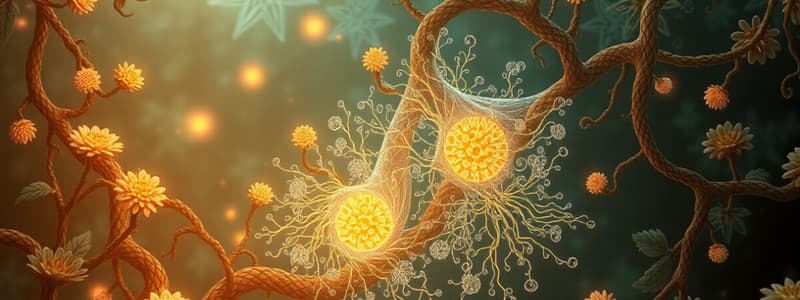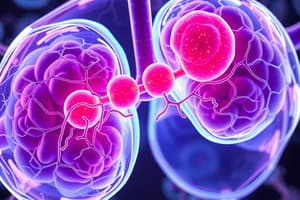Podcast
Questions and Answers
What is produced during anaerobic respiration in yeast?
What is produced during anaerobic respiration in yeast?
- Alcohol and carbon dioxide (correct)
- Lactic acid
- Glucose and oxygen
- Carbon dioxide and water
Which statement describes anaerobic respiration in muscle cells?
Which statement describes anaerobic respiration in muscle cells?
- It produces lactic acid without carbon dioxide. (correct)
- It uses oxygen to release energy.
- It occurs in the mitochondria.
- It produces alcohol.
Which of the following best distinguishes aerobic respiration from anaerobic respiration?
Which of the following best distinguishes aerobic respiration from anaerobic respiration?
- Anaerobic respiration does not use oxygen. (correct)
- Anaerobic respiration produces more energy than aerobic respiration.
- Aerobic respiration produces lactic acid.
- Aerobic respiration requires glucose only.
What is the main reason muscle cells switch to anaerobic respiration during vigorous exercise?
What is the main reason muscle cells switch to anaerobic respiration during vigorous exercise?
In which cellular location does anaerobic respiration take place?
In which cellular location does anaerobic respiration take place?
What is a common misconception about anaerobic respiration?
What is a common misconception about anaerobic respiration?
Which organism primarily undergoes anaerobic respiration to produce alcohol?
Which organism primarily undergoes anaerobic respiration to produce alcohol?
What occurs during anaerobic respiration in plants during short periods?
What occurs during anaerobic respiration in plants during short periods?
What is the primary function of alveoli in the human breathing system?
What is the primary function of alveoli in the human breathing system?
Which feature of gas exchange surfaces enhances their efficiency?
Which feature of gas exchange surfaces enhances their efficiency?
What happens to carbon dioxide during aerobic respiration?
What happens to carbon dioxide during aerobic respiration?
What role do goblet cells play in the respiratory system?
What role do goblet cells play in the respiratory system?
Why are the trachea and bronchi supported by rings of cartilage?
Why are the trachea and bronchi supported by rings of cartilage?
How does air enter the body through the respiratory system?
How does air enter the body through the respiratory system?
What characteristic of gas exchange surfaces allows oxygen and carbon dioxide to diffuse efficiently?
What characteristic of gas exchange surfaces allows oxygen and carbon dioxide to diffuse efficiently?
What is the role of cilia in the respiratory system?
What is the role of cilia in the respiratory system?
What is the primary nutrient used by cells to provide energy?
What is the primary nutrient used by cells to provide energy?
Where do most of the reactions in aerobic respiration occur?
Where do most of the reactions in aerobic respiration occur?
Which process occurs when cells release energy from glucose in the absence of oxygen?
Which process occurs when cells release energy from glucose in the absence of oxygen?
Which of the following is a product of aerobic respiration?
Which of the following is a product of aerobic respiration?
What is one of the functions of energy supplied by respiration in human cells?
What is one of the functions of energy supplied by respiration in human cells?
What is the balanced equation for aerobic respiration?
What is the balanced equation for aerobic respiration?
Which of the following activities would most likely increase breathing rate?
Which of the following activities would most likely increase breathing rate?
What is not a reason why cells need energy?
What is not a reason why cells need energy?
What triggers the brain to send nerve impulses to the diaphragm and intercostal muscles to increase breathing rate?
What triggers the brain to send nerve impulses to the diaphragm and intercostal muscles to increase breathing rate?
Which process occurs in the mitochondria and requires oxygen?
Which process occurs in the mitochondria and requires oxygen?
What is the main byproduct of anaerobic respiration in humans?
What is the main byproduct of anaerobic respiration in humans?
Which structure in humans is primarily responsible for gas exchange?
Which structure in humans is primarily responsible for gas exchange?
What effect does an increase in temperature have on the rate of respiration in yeast until a certain point?
What effect does an increase in temperature have on the rate of respiration in yeast until a certain point?
How does physical activity affect the rate and depth of breathing?
How does physical activity affect the rate and depth of breathing?
What happens to the muscles involved in breathing when exhaling?
What happens to the muscles involved in breathing when exhaling?
What is a characteristic feature of gas exchange surfaces in terrestrial animals?
What is a characteristic feature of gas exchange surfaces in terrestrial animals?
What is the primary function of the cartilage in the trachea?
What is the primary function of the cartilage in the trachea?
During inspiration, which statement is true regarding the diaphragm?
During inspiration, which statement is true regarding the diaphragm?
What happens to the volume of the thorax during expiration?
What happens to the volume of the thorax during expiration?
Which muscles assist in expanding the thorax during inhalation?
Which muscles assist in expanding the thorax during inhalation?
Where does gas exchange primarily occur in the respiratory system?
Where does gas exchange primarily occur in the respiratory system?
How is the rate of breathing primarily regulated?
How is the rate of breathing primarily regulated?
What role do bronchioles play in the respiratory system?
What role do bronchioles play in the respiratory system?
What happens when the rib cage is raised during inhalation?
What happens when the rib cage is raised during inhalation?
Study Notes
Using energy
- Living cells need energy for various functions: muscle contraction, protein synthesis, cell division, active transport, growth, nerve impulse transmission, and maintaining body temperature.
- Glucose is the primary energy source for cells.
- Respiration breaks down glucose to release energy.
- Respiration is a metabolic reaction controlled by enzymes.
Aerobic Respiration
-
Occurs in mitochondria.
-
Glucose is combined with oxygen to release energy.
-
Produces water and carbon dioxide.
-
Equation:
glucose+oxygen→carbon dioxide+waterglucose + oxygen \rightarrow carbon \space dioxide + waterglucose+oxygen→carbon dioxide+water
C6H12O6+6O2→6CO2+6H2OC_6H_{12}O_6 + 6O_2 \rightarrow 6CO_2 + 6H_2O C6H12O6+6O2→6CO2+6H2O
Anaerobic Respiration
- Occurs in the cytoplasm.
- Glucose is broken down without oxygen.
- Produces less energy than aerobic respiration.
- Yeast produces alcohol and carbon dioxide.
- Humans produce lactic acid.
- Muscle cells can respire anaerobically during vigorous exercise.
### Gas Exchange Surfaces
- Oxygen enters and carbon dioxide leaves the body through gas exchange surfaces.
- Must be permeable to gases.
- Features for efficient gas exchange: thin for rapid diffusion, close to a transport system, large surface area for efficient gas exchange, and a good oxygen supply.
The Human Breathing System
- Consists of lungs, windpipe (trachea), nose, mouth, bronchi, bronchioles, and alveoli.
- Alveoli are the gas exchange surfaces.
- Trachea has rings of cartilage to prevent collapse.
Breathing Movements
- Breathing in (inspiration) involves:
- Contraction of the diaphragm, pulling it downwards.
- Contraction of external intercostal muscles, pulling the rib cage upwards and outwards.
- Breathing out (expiration) involves:
- Relaxation of the diaphragm, allowing it to spring back up.
- Relaxation of external intercostal muscles, allowing the rib cage to move downwards.
Control of Breathing Rate
- Brain monitors blood pH.
- An increase in carbon dioxide or lactic acid in the blood lowers pH.
- Brain triggers faster and deeper breaths by stimulating diaphragm and intercostal muscles.
Summary
- Organisms need energy for various life processes, and this energy is obtained through respiration.
- Aerobic respiration uses oxygen and produces significant energy, water, and carbon dioxide.
- Anaerobic respiration is less efficient, does not use oxygen, and produces lactic acid in humans or ethanol and carbon dioxide in yeast.
- Gas exchange surfaces are specialized areas for oxygen entry and carbon dioxide removal.
- Human respiration involves lung ventilation through the trachea, bronchi, bronchioles, and alveoli.
- Breathing movements are controlled by diaphragm and intercostal muscles, increasing thoracic volume during inspiration and decreasing it during expiration.
- The brain regulates breathing rate based on blood pH, increasing it in response to elevated carbon dioxide or lactic acid levels.
Studying That Suits You
Use AI to generate personalized quizzes and flashcards to suit your learning preferences.
Related Documents
Description
This quiz covers essential concepts related to energy usage in living cells, including aerobic and anaerobic respiration. It also explores gas exchange and metabolic reactions that manage energy production. Test your understanding of how glucose and oxygen interact to produce energy.




